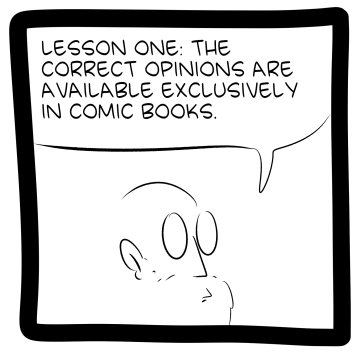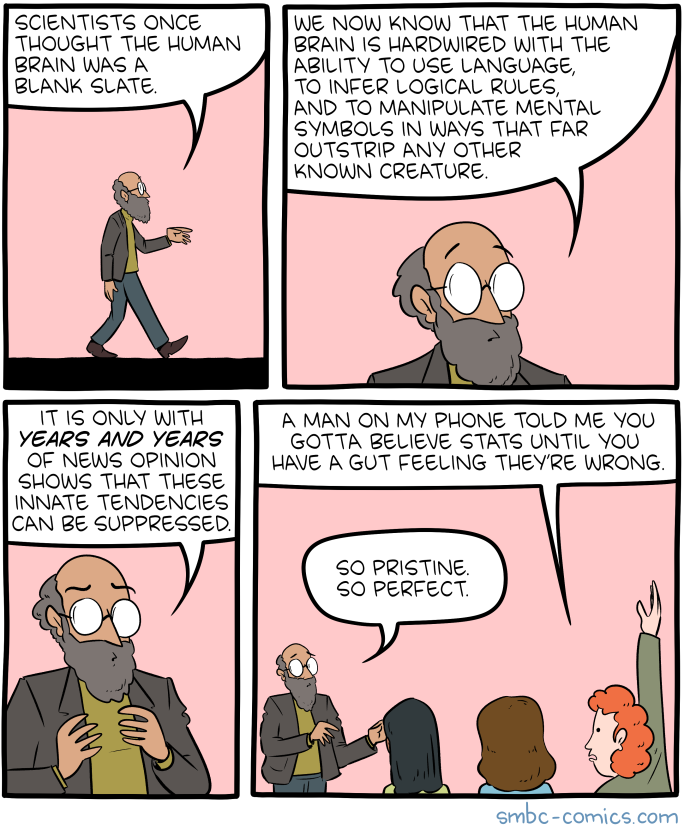Learning empiricism
« previous post | next post »
Today's SMBC:
Mouseover title: "Bonus points if you call people idiots when the stats are on your side and elitists when they aren't."
The aftercomic:

See also Lila Gleitman et al., "The Impossibility of Language Acquisition (and How They Do It)", Annual Review of Linguistics 2019:
After convincing myself that people know more than they can necessarily say, I still was extremely skeptical of Noam's idealization of a homogeneous speech community—sort of—which came out of that previous work that I did. And the claim that language was innate I couldn't even make out; what could that possibly mean? So I was not only an empiricist at heart, but one of my frequent sayings has always been “Empiricism is innate.”
And it certainly was with me. I'd say, What are you talking about? If you're in France, you learn French. If you're in England, you learn English. There's a sense in which it's totally obvious that language is learned from a very precise data set—sentences of English or sentences of French. Language learning comes from the outside in. But it's just as obvious that it's also from the inside out, because many of the cats and the dogs in the house are exposed to the same data set, and notoriously none of them learn English.

Philip Taylor said,
April 29, 2020 @ 7:26 am
I do not understand how to parse the speech bubble in frame three :
"It is only with years and years of news opinion that these innate tendencies can be supressed"
Is "news opinion" a noun phrase, and if so what does it mean ?
Philip Taylor said,
April 29, 2020 @ 7:41 am
Oops, "…news opinion shows that". I suppose that casts some doubt on my original hypothesis that "news opinion" is a noun phrase, but I still haven't the faintest idea what he is attempting to communicate in that bubble …
cameron said,
April 29, 2020 @ 7:52 am
@Philip Taylor: I read that as "it is only with years and year of [exposure to] news opinion shows" – where "shows" is a plural noun, short for "TV shows", or "radio shows".
Philip Taylor said,
April 29, 2020 @ 8:34 am
Ah, thank you, that helps enormously. I had not even considered "news opinion shows" as a possible noun phrase. Now it all make sense, but I cannot help but feel that there must have been a more transparent way of communicating the underlying idea.
Joe said,
April 29, 2020 @ 9:11 am
BERT knows a little bit of English – but fails when presented with synonyms: https://arxiv.org/abs/1907.11932.
David Marjanović said,
April 29, 2020 @ 9:30 am
The downside of the English spelling habit that puts spaces between the components of compound nouns (and, increasingly, doesn't consider hyphens either).
Rod Johnson said,
April 29, 2020 @ 9:55 am
The Gleitman piece is terrific, thanks for the link.
Andrew Usher said,
April 29, 2020 @ 6:42 pm
I don't agree with the premiss, yet I still got the intended reading immediately. 'News opinion shows' seems a little awkward, but the category it represents is familiar enough – and, no, hyphens would be impossible in that phrase.
Would 'opinion talk shows' be better?
k_over_hbarc at yahoo.com
D.O. said,
April 29, 2020 @ 8:01 pm
I thought about grouping "news opinion shows" as "[news opinion] shows" and as "news [opinion shows]" and neither makes the slightest sense. Yet the whole 3 word phrase does. I propose to call it "unbreakable compound"
cameron said,
April 29, 2020 @ 10:17 pm
I think the reason the "news opinion shows" phrase leads people down a garden path is the fact that "shows" is followed by "that". Rephrasing to remove the "shows that" should clarify
Viseguy said,
April 29, 2020 @ 10:32 pm
Ah, "news opinion shows" stumped me, too, momentarily. I assumed it was the Scotch… But — thank you, @cameron — the "that" didn't help, either.
Philip Taylor said,
April 30, 2020 @ 4:39 am
Andrew asserts that the category that "news opinion shows" represents is common enough, but I for one had never encountered the phrase itself before reading the present article. What makes them "news opinion shows" as opposed to "news opinion programmes" ? For me, a "show" exists purely for entertainment value, whilst a programme can inform, educate and entertain (the remit of the BBC). And are news opinion shows purely a North American phenomenon, or do we have them in the UK as well — I have not watched television for at least five years, so have no idea what genres of programme are now being transmitted.
Andrew Usher said,
April 30, 2020 @ 7:35 am
I think of 'show' as synonymous with 'program' in the television sense, and I think that's standard usage. It's the more common choice in phrases (such as this) denoting a particular type of production.
Bathrobe said,
April 30, 2020 @ 5:25 pm
"News-opinion shows" — how about "news commentary"?
Michael Watts said,
April 30, 2020 @ 6:46 pm
The comic is written in American English. Everything on TV is a show. It would be strange to try to refer to a show as a "program".
Philip Taylor said,
May 1, 2020 @ 5:30 am
Google's n-gram viewer suggests that (restricting UNIV to American English), "television show" overtook "television program" in around 1995. But does this reflect a change in usage, or a change in programme content ? Were there, in fact, more (North American) television programmes that set out to "inform, educate and entertain" prior to 1995, and has this now become minority output with the majority being purely intended to entertain ? Presumably "news opinion {programmes|shows}" set out to inform and educate as well as entertain, but are they now representative of a minority genre ?
KB said,
May 1, 2020 @ 5:23 pm
Gardeners' World, earlier this evening, BBC2: there was a contribution from a 20-something British-sounding woman, which she signed off with "love the show!". I wouldn't have said that when I was in my twenties, but it sounds unremarkable to me now.
Rod Johnson said,
May 1, 2020 @ 8:34 pm
The comic is written in American English. Everything on TV is a show. It would be strange to try to refer to a show as a "program".
This doesn't accord with my intuition as a US English speaker at all. "Program" seems perfectly normal, possibly slightly marked as a higher register. (I remember my grandmother, who would *only* have used "program"–"show" was reserved for movies at the theater.)
JPL said,
May 2, 2020 @ 2:37 am
Toward the end of the Lila Gleitman article she says, "The idea that concepts are some inborn, unlearned atoms of thought is an uncomfortable position for any serious empiricist. Yet every issue of developmental psychology reveals yet another abstract notion present and available to 6- or 10- month old infants. Where is this conceptual knowledge coming from? And how could it appear so dramatically early in life?"
Those are great empirical questions, and answerable with an empirical inquiry. (But don't just say they (i.e., what you call "concepts" or "conceptual knowledge") are "innate": this seems to only have the effect of shutting down inquiry prematurely, and besides, it doesn't really answer the question (of origins).)
Andrew Usher said,
May 2, 2020 @ 10:41 am
So it seems TV 'show' is slowly displacing 'program(me)', but the process is much farther along in American than British English. This is not really remarkable, I don't think.
To Philip Taylor: No, I don't think whether the content is "to inform, educate, or entertain" is relevant – nor are any technological changes in how people "watch TV".